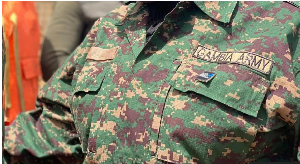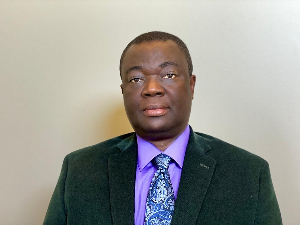The 2nd edition of the national symposium on child trafficking has been held in Accra with the call on stakeholders to collaborate more to eliminate the menace.
The purpose of the symposium was to create an avenue for dialogue among stakeholders from media, civil society, representatives from government agencies and other stakeholders including community members in Ghana to dialogue on the matter, nature and scope of child trafficking and to reflect on the advances to date and challenges ahead.
West African Director of Free The Slaves, Mr. Joha Braimah in his opening remarks said the 2nd edition of the symposium presented an opportunity for a follow-up to take stock of the remarkable progress on some of the challenges identified and accompanying recommendations made towards addressing child trafficking moving forward.
Mr. Braimah bemoaned the lack of action to curb the menace, adding that the activity, criminal as it is, rather remains on the rise.
“The manifestation of human trafficking in any part of the world has been the main driving force behind any legislative instrument to combat it. We are in 2020 – 20 years since the Palermo Protocol on trafficking was enacted – and we are still talking of an activity that is criminalized globally and seemingly on the rise,” he lamented.
Though the West African Director acknowledges the difficulties in estimating global numbers of victims affected due to the clandestine nature of the activity and limited empirical activity, he nevertheless observed the US State Department’s 2020 TIP report which notes that about 118,000 victims of trafficking have been globally identified which represents a worrying 24% increase from the 2019 report.
Deputy Chief of Mission, Christopher Lamora, who represented Stephanie S. Sullivan, the US Ambassador to Ghana noted that the US upgraded Ghana from Tier II watch list to Tier II, adding that Ghana had maintained this position for two years.
He was hopeful that the country would attain Tier III as the United States stands in defense for human rights and is diligently collaborating with Ghana to eliminate child trafficking.
Mr. Christopher Lamora also urged all stakeholders to collaborate to work together to address the challenges and gaps that have been identified for a fruitful prosecution and response.
Chief Director for the Ministry Of Gender, Children and Social Protection, Dr. Afisah Zakariah also noted that the last five years under the Child Protection Compact Agreement helped the Ministry to have a common approach and goal on various issues confronting the country which facilitated dialogue, created platforms for actions, negotiating voices and tools to use for mobilizing resources in the fight against child trafficking in Ghana.
According to the Chief Director, the Ministry has synchronized its actions with that of the national plan which has enhanced coordination among players through information sharing.
“The ministry has harmonized our actions into the national plan of action for human trafficking and its related practices and actions. These have enhanced coordination and information sharing among key players in the field through experience sharing, grass root engagements and preventive efforts,” Dr. Afisah Zakariah noted.
He said Ghana currently had strong government commitments, existing inter-ministerial frameworks and active civil society groups coupled with its potential to reduce child trafficking through improved coordination, enhanced investigations and prosecutions and the strengthening of the country’s legislative and policy framework for child protection through the standard operating procedure tools developed.
On her part, Victoria Klimova who is the IOM CT Project Manager, enumerated the achievements, gaps and challenges in achieving the 4P objectives of the CPC Project including Prevention, protection, Prosecution and Partnership.
According to her, challenges such as lack of partnership, narrow focus on child exploitation and labour in fishing and none correspondence to the needs of the national data collection together with gaps such as inadequate coordination mechanism, insufficient involvement of Parliamentary Select Committees on Social Welfare and knowledge gap in TiP for traditional leaders among others, must be addressed to achieve the 4P objectives of the CPC Project.
Monitoring, Learning & Evaluation Associate at FTS, Ms. Sonia Adu-Gyamfi who spoke on Child Protection Compact Interventions to address child trafficking in fishing in Ghana noted that suspected cases of child sex trafficking were only recorded in five communities of the Central Region, adding that though other regions may have recorded cases, the clandestine nature of trafficking made it difficult to detect these cases.
She cited Poverty, large family size/high fertility rate, deception, unplanned pregnancies and economic vulnerability as some eenabling factors of child trafficking and child marriage and called for awareness creation to curb the problem.
Executive Director of International Needs Ghana, Cromwell Awadey outlined some gains made in its efforts to provide comprehensive, gender-sensitive, trauma-informed care and case management services to child trafficking victims.
These gains include increased knowledge on child trafficking in the communities, the anti-slavery groups becoming the first point for cases of child trafficking, improvement in the confidence of survivors, among other gains.
Mr. Awadey however identified interference in the prosecution of suspected traffickers and stakeholders, community members concealing information about traffickers, community level anti-slavery groups living in fear of being attacked by traffickers, as some challenges encountered by the INGH.
He proposed the resourcing of state institutions, state institutions working with community level anti-slavery groups, the need to scale up interventions into other communities where cases of trafficking are found as ways to end human trafficking.
Other stakeholders who attended the symposium were representatives from the Ghana Immigration Service, Department of Social Welfare and Child Labour Unit and some NGOs.
General News of Monday, 5 October 2020
Source: Michael Oberteye, Contributor













